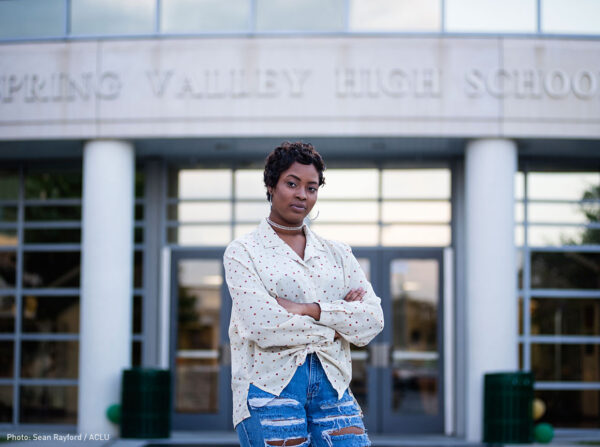Federal Appeals Court Affirms Studentsã First Amendment and Due Process Rights in School
RICHMOND, Va. ã The Fourth Circuit Court of Appeals yesterday handed down a victory for studentsã rights, ruling that South Carolinaãs ãdisturbing schoolsã law poses a substantial risk to student freedom of expression and due process, and that the plaintiffs in Kenny v. Wilson deserve their day in court. The law allows children to be arrested and prosecuted for any behavior a school deems ãobnoxious,ã such as failing to follow a teacherãs instruction or cursing at lunchtime.
The âü¯áû颈§Ý§Ã¿« and the âü¯áû颈§Ý§Ã¿« of South Carolina filed Kenny in 2016 on behalf of Niya Kenny and other student plaintiffs. At Spring Valley High School in Columbia, Kenny was arrested and taken to a detention center because she had cried out after she saw a school resource officer picking up a classmate and throwing her to the ground.
Sarah Hinger, staff attorney with the âü¯áû颈§Ý§Ã¿«ãs Racial Justice Program, had the following response:
ãThe court has sent a clear message: rather than funnel children into the criminal justice system over minutiae and lawful activities, schools must recognize and protect studentsã rights. This message is particularly important in this time of student activism.
ãUnder South Carolinaãs so-called ãdisturbing schoolsã law, Black students are nearly four times as likely to be punished than white students. That means that Black children are disproportionately saddled with criminal records and other burdens that come with charges and arrests.
ãIn its ruling, the court recognized the lawãs discriminatory impact, finding that ãthe threat of enforcement is particularly credibleã for plaintiffs who are Black, and for those who have disabilities.ã
For the ruling, go to:
/cases/kenny-v-wilson
For more information:
âü¯áû颈§Ý§Ã¿« Racial Justice Program
/issues/racial-justice
âü¯áû颈§Ý§Ã¿« Womenãs Rights Project
/issues/womens-rights
âü¯áû颈§Ý§Ã¿« of South Carolina


